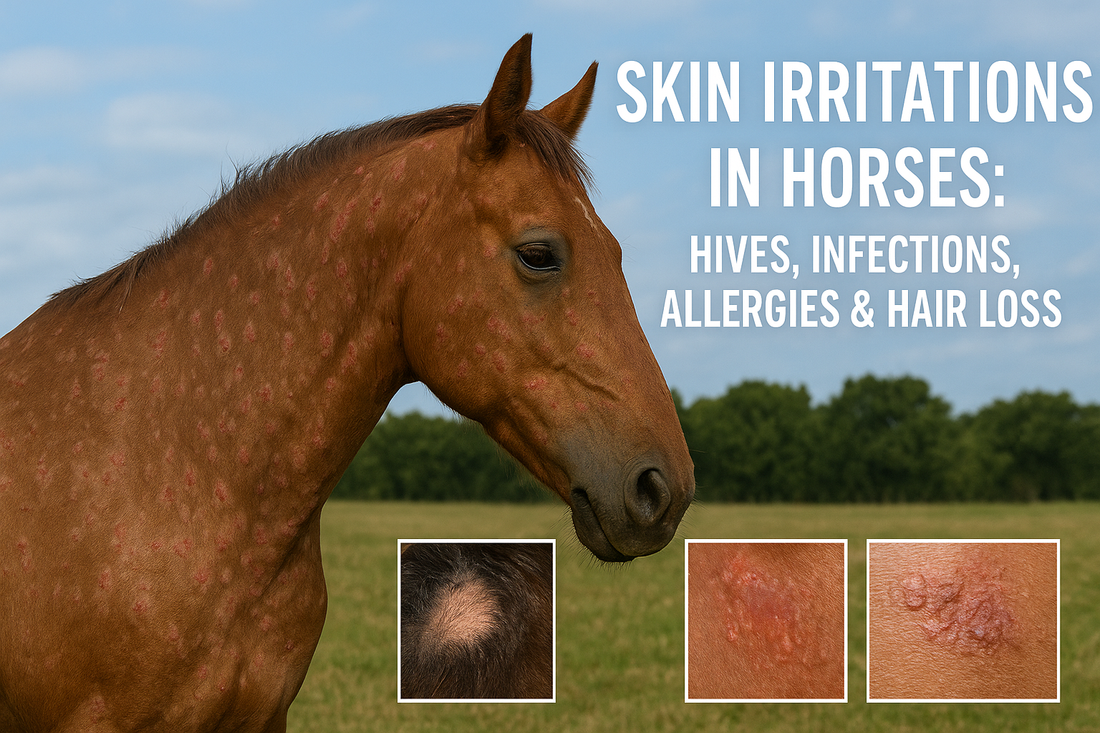Ever noticed your horse rubbing against a fence, rolling more than usual, or sporting mysterious bald patches? It’s not just a “rough coat day.” Horse skin irritation can sneak up fast, one day your horse looks fine, and the next, he's covered in bumps, itchy spots, or flaky patches. There can be many causes for skin problems, including allergies, infections, or other underlying health issues, despite what it might seem like.
The good news? Most skin irritations are treatable once you know what you’re dealing with. From hives that appear out of nowhere, to fungal infections that won’t quit, to hair loss caused by pesky allergies, we’ll break it all down in plain language. By the end, you’ll know the common causes, warning signs, and the best steps to help your horse’s skin heal and stay healthy.
Why Do Horses Get Skin Irritations?

Horses deal with a lot, from flies and mud to tack rubbing and allergens. Here are the big reasons skin problems pop up -
- Bug Bites - Insect bites and stings (like from midges or flies) are huge troublemakers. Some horses react to their bites with allergic itching or skin damage.
- Allergic Reactions - Horses can be allergic to airborne stuff like dust, mold, pollen, or things they eat or touch. These can cause inflammation, itching, hives, or hair loss.
- Infections - Skin serves as a barrier against bacteria and fungi, but when it becomes damaged or irritated, they can enter. A minor wound can lead to infection, such as cellulitis.
- Parasites - Things like lice or pinworms can make horses chew or scratch, leading to bald spots, sores, and rough coats.
- Fishy Tack or Environmental Factors - Ill-fitting gear, grooming products, pressure points, and muddy conditions can all irritate the skin.
Finding out what's triggering your horse's skin issue will help you relieve it.
Hives (Urticaria): What They Are & Why They Pop Up

“Hives” in horses, also called urticaria, are raised, itchy bumps or swellings on the skin. They can emerge out of nowhere within minutes or hours and fade just as suddenly.
What usually causes hives?
- Insect bites or stings
- Medications or vaccines
- Exposure to allergens (food, airborne, topical)
- Rare Causes - ringworm, vasculitis, autoimmune issues
How They Develop - Hives are usually immune reactions (type I hypersensitivity) where the body releases histamine in response to something perceived as a threat.
Infections and Irritations: When Bacteria or Fungi Join the Party

When your horse keeps scratching, missing patches of hair, or if the skin looks raw or scabbed, it's a sign the skin barrier might be compromised. That invites secondary infections, especially bacterial infections like cellulitis.
Key examples -
- Cellulitis - A painful, often swollen infection, usually on the legs. A scratch or wound can open the door.
- Greasy Heel (Scratches) - Thickened, sometimes cracked skin on pasterns, common in damp, muddy environments.
These problems can be uncomfortable and keep coming back if not properly treated or if the underlying issue (like constant moisture) isn’t addressed.
Allergies and Hair Loss: Itchy Horses That Lose Their Shine

When horses suffer from allergies, their skin may feel itchy, they may develop hives, they may exhibit thickened patches, or their hair might fall out. You should look for scratching, rubbing, and bald patches.
Common allergy triggers include -
- Insect bites (like Sweet Itch from biting midges)
- Dust, mold, pollen in stables or feed
- Grooming products, shampoos, tack contactants
- Certain foods, medications, or vaccines
There is a medical condition called Sweet Itch (insect-bite hypersensitivity) that causes horses to rub themselves raw and cause intense itching. The key to controlling flies is often topical treatments.
What You Can Do to Support Your Horse’s Skin Health?
Here’s a practical toolkit to calm your horse’s skin and help them heal -
1) Early Detection - Watch for odd behaviors, hair loss, or peculiar patches. Addressing things early helps prevent infections and further complications.
2) Bug Control - Use fly masks, sheets, repellents, and minimize insect exposure (especially for conditions like Sweet Itch).
3) Environmental Cleanup - Keep stalls clean, reduce dust and mold, groom regularly, and pick bedding that irritants aren’t likely to spike.
4) Review Tack and Grooming Products - Swap to hypoallergenic grooming products and make sure tack fits well, not rubbing or trapping moisture.
5) Nutrition and Supplements - General veterinary consensus suggests skin-supporting supplements like omega-3 fatty acids, but always talk to your vet first.
6) Prompt Veterinary Help - For persistent hives, infections, or severe itching, a vet can run tests, prescribe antihistamines or corticosteroids, or manage bacterial infections.
Summary to Skin Irritations in Horses

Your horse’s skin tells a story, sometimes it’s a tale of too many flies, sometimes it’s an allergy flare-up, and sometimes it’s an infection that needs quick attention. A key to identifying and resolving small irritations is noticing them early and acting before they grow to be large ones.
To keep your horse comfortable, you can swap out grooming products, control bugs, adjust their environment, or seek veterinary help. While supplements and creams can help, the real magic happens when you find and fix the root cause.
Shiny, healthy coats aren't just about looks; they're a sign of a horse who is happy and comfortable. They'll thank you with bright eyes, eager ears, and plenty of happy gallops if you watch their skin.
Frequently Asked Questions
1) Why is my horse itchy and losing hair?
This is often due to allergies (like insect-bite hypersensitivity or Sweet Itch), environmental triggers (dust, mold, pollen), parasites, skin infections, or contact irritants. Itchy horses may scratch or rub themselves, resulting in hair loss, bald patches, or secondary infections. Try environmental changes first and consult a vet if it continues.
2) What is the most common cause of hives in horses?
Insect bites (like those from flies or midges), drugs, or other allergens (food, topical products, or exposure to the environment) are the most common causes.
3) What supplements are good for horses with hives?
Generally, veterinarians recommend anti-inflammatory support like omega-3s or other skin-nourishing nutrients. The most important step is to identify and remove the trigger, allergy management often relies on prevention and comfort, not just supplements. Always check with your vet before starting any supplement plan.



